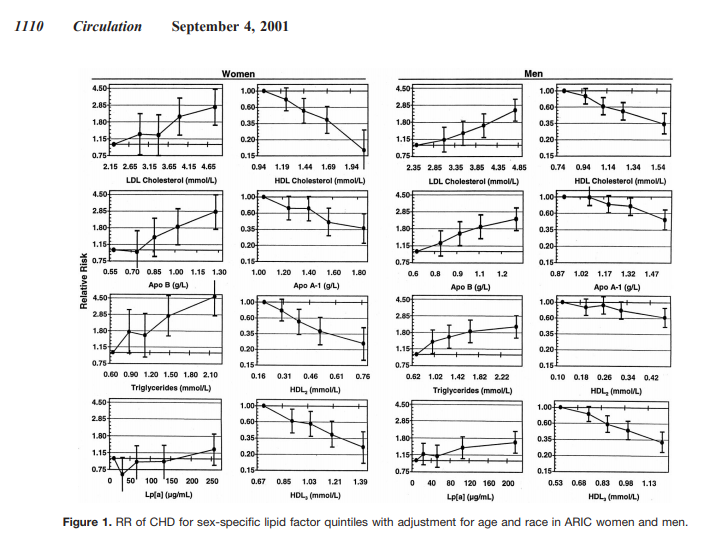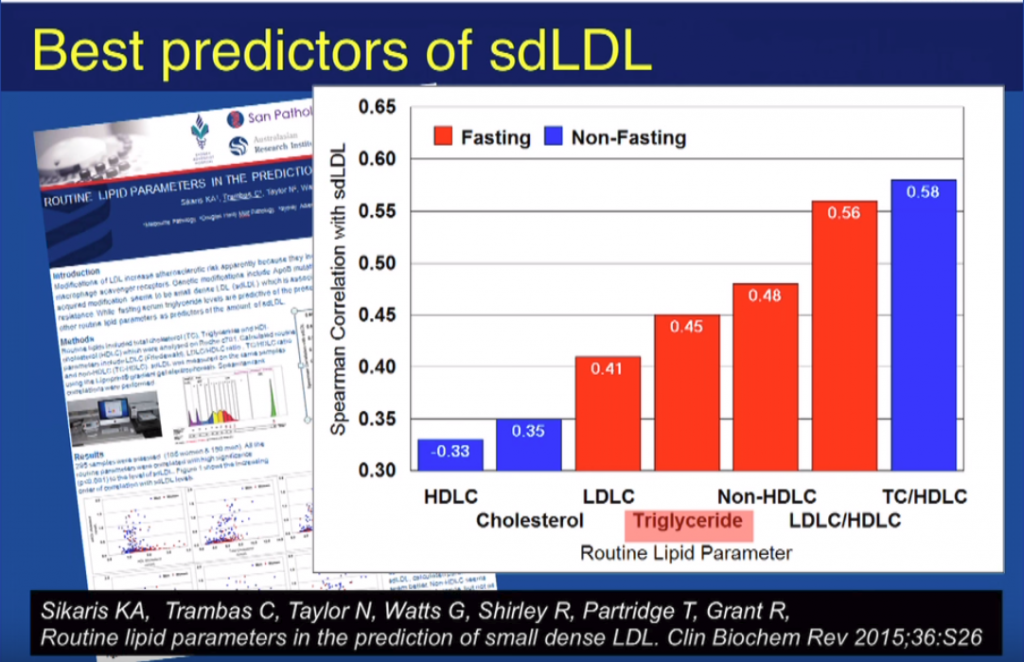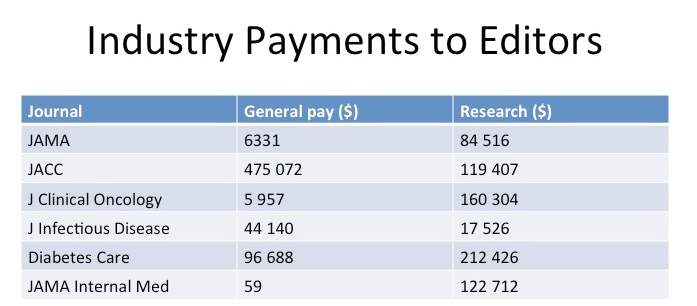 In my 5 years of experience blogging on Low Carb, High Fat and Zero Carb diets I have seen a consistent pattern. what I regularly see is that a person’s weight, Hemoglobin A1c (a measurement of the average blood sugar for the last 90 days), Triglyceride levels, and C-Reactive Protein (a measurement of overall body inflammation) all go down while the beneficial HDL Cholesterol shoots up. But in most cases the “suspect” LDL and Total Cholesterols often go up, usually dramatically by current recommended standards. The next thing I hear is that an uncle who is a doctor or a cousin who is a nutritionist says “you have to go low fat, high fruit, high whole grains or you will soon have a heart attack. I would like to explain why in my opinion Total Cholesterols in the range of 200-400 mg/dl (5.172-10.34 mmol/l) and LDL Cholesterols in the range of 130-300 mg/dl (3.362-7.758 mmol/l) are quite healthy and normal. I plan to include all the scientific articles and charts I have collected over the years on the subject in case people would like to show it to their medical providers to start a conversation about the subject with their own medical provider.
In my 5 years of experience blogging on Low Carb, High Fat and Zero Carb diets I have seen a consistent pattern. what I regularly see is that a person’s weight, Hemoglobin A1c (a measurement of the average blood sugar for the last 90 days), Triglyceride levels, and C-Reactive Protein (a measurement of overall body inflammation) all go down while the beneficial HDL Cholesterol shoots up. But in most cases the “suspect” LDL and Total Cholesterols often go up, usually dramatically by current recommended standards. The next thing I hear is that an uncle who is a doctor or a cousin who is a nutritionist says “you have to go low fat, high fruit, high whole grains or you will soon have a heart attack. I would like to explain why in my opinion Total Cholesterols in the range of 200-400 mg/dl (5.172-10.34 mmol/l) and LDL Cholesterols in the range of 130-300 mg/dl (3.362-7.758 mmol/l) are quite healthy and normal. I plan to include all the scientific articles and charts I have collected over the years on the subject in case people would like to show it to their medical providers to start a conversation about the subject with their own medical provider.
I think for most people, one goal of going on a low carb, high fat diet is to lower heart attack risk. the combination of lowering Triglycerides and elevating HDL Cholesterol seen on low carb diets lower heart disease risk more than simply lowering LDL Cholesterol. Here is a table from this article in the Journal Circulation:

What you will see is that if you drop your LDL Cholesterol from the highest group to the lowest risk group your relative risk of heart disease decreases from 2.5 to 1 in men and from 2.85 to 1 in women, a decrease of risk by 2.5 times and 2.85 times for a woman. If you raise your HDL Cholesterol from the lowest group to the highest group your relative risk goes from 1 to 0.35 in a man and from 1 to 0.17 in women, lowering you risk by 3 times in a man and over 5 times in a woman. In the same way lowering your triglycerides from the highest risk group to the lowest decreases the risk factor by 2X for a man and 4.5X for a woman. Here’s a summary of that data:

So a man who goes on a Low Carb, High Fat diet and optimizes HDL and Triglycerides can get a total decrease in heart risk of 5X and a woman can get a 9.5X risk reduction. However if our low carb dieter were to follow the advice to add back carbohydrate he would see his triglycerides rise. Here’s a quote from this article in the Journal of Nutrition: “When the content of dietary carbohydrate is elevated above the level typically consumed (>55% of energy), blood concentrations of triglycerides rise. This phenomenon, known as carbohydrate-induced hypertriglyceridemia, is paradoxical because the increase in dietary carbohydrate usually comes at the expense of dietary fat. Thus, when the content of the carbohydrate in the diet is increased, fat in the diet is reduced, but the content of fat (triglycerides) in the blood rises.” Also as carbohydrate intake increases HDL Cholesterol goes down. Here’s a quote from this article in the Journal of the American College of Nutrition: “there was an inverse association between percentage of calories from carbohydrate and HDL-C levels.” So by taking the advice to add back carbohydrate a person inevitably sees his HDL and Triglyceride levels reflecting a higher risk of heart disease.
The reason I feel that the LDL elevation is not a significant problem is that all LDL Cholesterol particles are not created equal and range in size from large and fluffy to small and dense. The small dense variety is much more highly associated with heart disease. One of the best ways to tell if your LDL particles are the beneficial large fluffy kind is to look at the ratio of the triglycerides divided by the HDL Cholesterol. The lower this number is the more likely the LDL particles are to be the healthy large fluffy variety. And as we saw above Low Carb, High Fat diets drive the HDL up and the Triglycerides down sending this ratio in the right direction while a high carb diet does just the opposite increasing our heart disease risk. In the table below you can see that the Triglyceride/HDL Ratio is the best predictor of whether you have small dense LDL (sdLDL)

As for having a very high Cholesterol, I love this study of Japanese men in Hawaii where they measured their Cholesterol every year for 20 years and found that the higher the Cholesterol levels were the longer they lived. It obviously wasn’t the result they were looking for because here is a quote from their conclusion: “We have been unable to explain our results. These data cast doubt on the scientific justification for lowering cholesterol to very low concentrations (<4·65 mmol/L) in elderly people.” People who recommend low fat diets to lower Total and LDL Cholesterol have a lot of trouble explaining this study of 68,094 people who were 60 years of age and older published in the British Medical Journal recently which showed that the higher their LDL and total Cholesterol was, the less likely a person was to have a heart attack or Alzheimer’s and the longer he was likely to live. So I personally couldn’t imagine why anyone over 60 would consider lowering their LDL and total Cholesterol with a low fat diet in light of this study.
I also believe that statin medications for people who have not already had a heart attack are counterproductive and that their use even in people who have already had a heart attack may not be the best approach. I have written about that in this post.
So why do the articles in Major Scientific Journals recommend low fat products and statin medications? In my opinion much of it is driven by money from the processed food manufacturers and and pharmaceutical companies. Another thing I have noted is that many researchers are vegetarian for either moral or religious reasons and I feel this tends to produce strong “confirmation bias” in these researchers and practitioners. Here is an example from this articles in the British Medical Journal from 2017 on how much the editors of the major medical journals and the gatekeepers of what research is and isn’t published receive from the pharmaceutical industry:

Please note at $475,072 in general pay and $119,407 in research grants, the editors of the Journal of the American College of Cardiology that controls publication of articles on statin medications and the use of polyunsaturated cooking oils produced by agribusiness are recompensed quite handsomely.
As a retired family medicine doctor who twice passed the board certification exam, the body of scientific evidence I have found clearly supports the points I have made above. I welcome anyone to challenge my positions point by point in the comments. I will not post comments that are vague, rambling and do not address a particular point I have made but I will certainly allow and comment on posts that address a particular point and include scientific evidence to support or refute it.

My doctor told me to watch my fat intake because my LDL went up to 165, which raised my total cholesterol to 250. But my triglycerides went down to 45 amd my HDL went up to 85, making my ratio really good. So I’m thinking I can ignore her concern and advice??
Ashley my Total and LDL Cholesterol are much higher than yours and I am delighted with them. Doctors are busy people and don’t have time to dig into journals and textbooks so most of the continuing education on nutrition they get (and they get very little in medical school) gets heavily influenced by pharmaceutical and agribusiness money. Selling statins is a multi-billion dollar industry. And if you cut fat, I assure you those wonderful HDL and Triglyceride numbers cutting your cardiac risk by 9 times will almost certain deteriorate.
Thank you! We follow a LCHF lifestyle and my Total cholesterol is ‘high’ according to current recommendations. Your article reinforces my belief that we’re doing the best lifestyle programme.
My husband is a newly diagnosed type 1.5 diabetic and after a year of LCHF eating, is metformin-free and virtually off his insulin.
Again, my thanks for your clear explanation re the cholesterol debate!
Excellent article! Thank you! Very timely.
Obviously thoroughly researched and I appreciate the information from other medical sources that you always embed. That independent information correlates so convincingly with your comments, medical experience, and suggestions.
Thanks Paul for your committment to educating in layman terms.
My low carb journey took my LDL and Triglycerides too 700+ due to a lack of lipase production needed to break down tryglicerides. I’m still trying to figure out how to avoid carbs but it looks like I need low carb and low fat
Bobby, there are inherited conditions that predispose one having high triglyceride levels, perhaps you have one of these. Almost everyone who begins a low carb, high fat diet and follows it faithfully sees their triglycerides fall under 100 with just 2-3 weeks, often sooner.
My last blood tests showed that my HDL went up and my Trigs were down from the previous one 18 mos before. However, my TC tripled and my LDL went sky high. My doctor wanted me on a statin immediately due to cardiac events within my immediate family. My #’s are TC 12.53 mmol (up from 5.56), Trigs 1.63 (down from 2.19), LDL 10.55 (Up from 3.64), HDL 1.24, (up from 0.93), Chol/HDl ratio 10.1. My Dr. told me he has never seen a ratio so high and is very concerned, although supportive of Keto. I did your formula “ratio of the triglycerides divided by the HDL Cholesterol”, mine is 1.314. I cannot determine if this is good or bad. I am 9 months keto, all inflammatory markers are now within normal for the first time in decades. Can you please advise if I have to be worried about these ratio #’s. Thanks!
Kel, Your doctor has probably never seen such a high Cholesterol because none of his patients ever ate as healthy a diet as you are eating. There are so many risk factors for heart disease, like for instance, being poor is a major risk factor. Here’s a quote from a recent study of the homeless “Cardiovascular diseases are a major cause of mortality in homeless adults between 45 and 64 years old and are three times more common in the homeless aged 25 to 44 years when compared to an age-matched general population”. In my opinion the Total Cholesterol/HDL ratio is just another weak indicator of heart disease risk. Also if you are in a weight loss phase, since Cholesterol as well as fat is stored in fat cells, when the fat comes out of the fat cells to be burned, less Cholesterol can be stored and a lot comes out into the blood stream raising total cholesterol while weight loss is taking place. In this study of 374 people with suspected heart disease they looked at the lipid profile and the results of the cardiac catheterization. Guess which ratio best predicted those who were found to have cardiovascular disease, The triglyceride/HDL ratio. Here is the study’s conclusion: “CONCLUSIONS: Although some lipid variables were associated with the extent of coronary disease, the ratio of triglycerides to HDL-cholesterol showed the strongest association with extent.” Link: https://www.ncbi.nlm.nih.gov/pmc/articles/PMC2664115/
Thank you Dr. Mabry. I reached my goal weight of 120 lbs a couple of months ago. I am 58 yrs old. I have lost a total of 97 lbs in the past year (3 mos on Weight Watchers, the rest on Keto). My BP also went up, although I did not agree to take the statin, I did agree to take the coversyl. In the past month, my BP finally came down (I am currently on my 4th refill). I tried to understand the information in the link but it’s information overload for me and I can’t process or understand it. I guess my question is, if my ratio of the tri/HDL is 1.314 mmol (50.733 mg/dL), am I at risk?
Kel, congratulations on your amazing transformation! Your Cholesterol and HDL levels are almost the same as mine and I am think they are great based on all I know. I think pushing the Total Cholesterol/HDL which is basically a surrogate way of measuring LDL Cholesterol because even the drug companies realize that LDL Cholesterol which is not measured but calculated and may be bad or good as the large fluffy LDL is good, only the small dense LDL is bad. Well testing the Total Cholesterol/HDL ratio basically been driven by drug company money in their drive to put everybody in the world on a statin as since the ratio is driven by LDL so their statin medicines will make that ratio look better but would not help the Trig/HDL ratio. I think the triglyceride/HDL ratio is a much more sensitive measure but is not liked by most doctors because the low fat, high carb diets they recommend will make it get worse.
The most common cause of a high blood pressure reading in a doctors office is being scared of having a high blood pressure reading in your doctors office. Studies have shown that at least 50% of blood pressure medications prescribed are unneeded when the blood pressure is measure by the 24 hour ambulatory blood pressure monitoring that monitors you blood pressure around the clock at home when you’re relaxed. Your blood pressure can go from 110/55 to 180/120 in under a minute if you sympathetic, fight or flight nervous system is triggered by an fear or anxiety and you body secretes a bunch of adrenaline (epinephrine in Britain). So unless your doctor has done a 24 hour ambulatory blood pressure monitor on you I would think twice about taking a blood pressure medication. This not just my opinion the United States Joint Public Service Task Force, an official government body has said this about the need for Ambulatory Blood Pressure Monitoring before treating with blood pressure medications (ABPM): “The USPSTF found convincing evidence that ABPM is the best method for diagnosing hypertension. Although the criteria for establishing hypertension varied across studies, there was significant discordance between the office diagnosis of hypertension and 12- and 24-hour average blood pressures using ABPM, with significantly fewer patients requiring treatment based on ABPM (Figure 1).30”